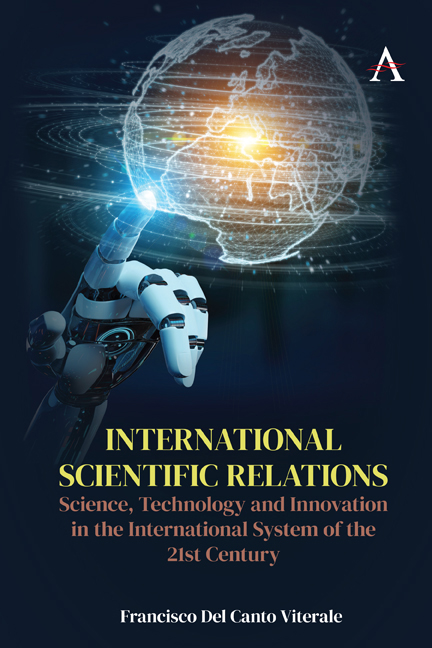 International Scientific Relations
International Scientific Relations 8 - Configuration of International Scientific Relations
Published online by Cambridge University Press: 08 October 2021
Summary
Having examined the different elements that form the ISR (Chapters 2 to 5), the new realities that have emerged within ISR (Chapter 6) and having defined the main roles adopted by scientific knowledge in the current international system (Chapter 7), the goal of this chapter is to explore the final configuration that ISR has acquired in the current world order.
A complete explanation of the current configuration of ISR requires a detailed description of two main elements of any world order:
–the systemic parameters, and
– the global structure that forms.
Systemic Parameters
Systemic parameters are all the constituent parts and elements of the system, which operate within the system's limits and, due to their dynamic nature, influence and are influenced by the system as a whole. All these parameters perform a key role in determining the final configuration of the system, and for this, it is necessary to analyze what kind of traits they transfer to the global configuration.
Actors
The first element of analysis in the current configuration of ISR is the international actors that have emerged as essential units that act and pursue their interests within the international system. In this sense, it is possible to define various characteristics of the international actors that influence the final configuration of ISR:
– A larger number of international actors show interest in STI (seen as a strategic resource for economic, political, and social development), which is manifested in higher participation of actors in all processes related to scientific knowledge (production, intermediation, distribution, application, and governance).
– A larger number of international actors (both States and non-State) are interested in STI, which means an expansion of participants and interests.
– A larger diversity of actors taking part in the processes linked to scientific knowledge, be they States (including emerging and less developed countries) or non-State actors (such as transnational companies, epistemic communities, or think tanks).
– The university, the actor traditionally charged with producing and transmitting knowledge, must now share its tasks with other actors and take on new functions (the third mission), because of which it has started to develop new strategies to adapt to this new global context.
- Type
- Chapter
- Information
- International Scientific RelationsScience, Technology and Innovation in the International System of the 21st Century, pp. 199 - 210Publisher: Anthem PressPrint publication year: 2021


